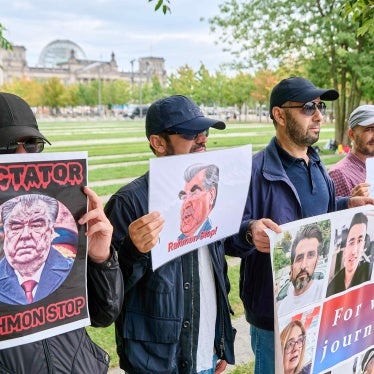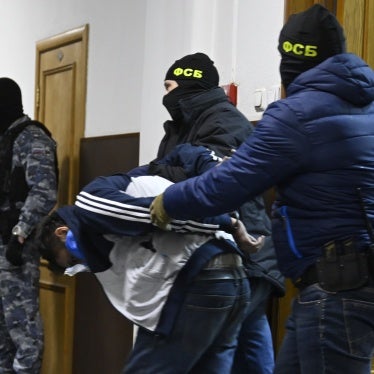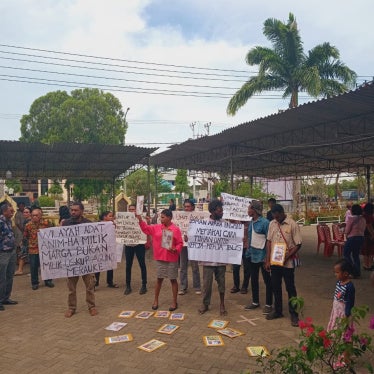Dictatorships should not be rewarded. A simple enough lesson, you might think. It is, however, a lesson that Britain and other European governments seem reluctant to take on board. Clare Short, the Secretary of State for International Development, is due to chair the annual meeting of the European Bank for Reconstruction and Development (EBRD), to be held in the central Asian republic of Uzbekistan in May. Uzbekistan is distinguished by human rights abuses on an epic scale. And yet it looks as if the meeting will go ahead with no real strings attached. This makes no sense at all. It amounts to a reward for (very) bad behaviour.
Clare Short, the Secretary of State for International Development, is due to chair the annual meeting of the European Bank for Reconstruction and Development (EBRD), to be held in the central Asian republic of Uzbekistan in May. Uzbekistan is distinguished by human rights abuses on an epic scale. And yet it looks as if the meeting will go ahead with no real strings attached. This makes no sense at all. It amounts to a reward for (very) bad behaviour. A United Nations special rapporteur talked of the "systemic torture" that he found; the British ambassador rightly notes that "brutality is inherent" in the government of President Islam Karimov, a survivor from the Soviet era.
Police in Uzbekistan use electric shock, beatings and rape to compel confessions. They asphyxiate detainees with plastic bags, sprinkle chlorine in gas masks and shut off the air. In basement cells, they hang men naked by their wrists and ankles. In one case last year, doctors found that burns on the body of a prisoner who died in custody were caused by immersion in boiling water. The hands had no fingernails. That is the style of the Karimov regime.
And yet Short has so far flatly rejected any suggestion that Karimov should make a few small concessions towards good governance in the run-up to the meeting. The mandate of the EBRD, whose majority shareholders are the governments of the European Union, is explicitly political. Its role was clear from the time of its foundation, after the revolutions of 1989: to help foster democracy and market economies in the former communist bloc. Jean Lemierre, the president of the bank, continues to talk of the Tashkent meeting as an "incentive to democracy." With the bank unwilling to make Uzbekistan work for its "incentive," it looks like nothing of the sort. Rather, this prestigious meeting is in danger of appearing to be a bonus plan for repression.
The EBRD's website, encouraging participation in the Tashkent meeting, praises the joys of tourism in Uzbekistan, including the golden road to Samarkand and the wonders of Bukhara. On human rights abuses - nothing. There is a time and a place for quiet diplomacy but this is not it. By continued inaction - however well-intentioned it may be - Britain and the bank encourage the Uzbek government to believe that it can continue with censorship, arbitrary arrests and the torture and killing of government critics, or of those whose religious beliefs are considered unacceptable.
All participants are eager to emphasise that tough words will be spoken at the meeting in May. By then, however, such words will be much less powerful than if they were spoken today. The muzzled Uzbek media are unlikely to give much publicity to tough talk once the meeting is under way. Critical speeches can easily be lost without trace, as Theo van Boven, the UN special rapporteur on torture, discovered during his outspoken visit at the end of last year.
There is still time for Britain to change this ultimately futile approach. The threat of moving the venue could help concentrate Karimov's mind, even at this late stage. Clare Short and her colleagues could make it clear to Karimov that if he wants to avoid embarrassment all round and make the meeting a success, he should take a few easy steps to curb torture, release jailed human rights activists and allow human rights groups to register.
Uzbekistan has been eager since 9/11 to use the "war against terrorism" as an excuse for repression. It wants to portray itself as a loyal ally - and was quick to praise Colin Powell's speech on Iraq at the UN earlier this month. But neither his political usefulness nor the widespread poverty in the region can be an excuse for letting Karimov off the hook. Short talks of the need for "external engagement" with impoverished countries such as Uzbekistan. But security, poverty and human rights cannot be treated as separate issues. They are intricately interlinked – the essential elements of sustainable development. Pressing for human rights progress signals a meaningful engagement that does more than give power to the corrupt and abusive dictators at the top. The British government must ensure that the message is heard, loud and clear.
It is also an important message for ordinary Uzbeks to hear -and for corrupt rulers in the region, who might seek to persuade themselves that democracy is a mere optional extra, when seeking loans and expertise. The potential dividends are huge - and only institutional lethargy stands in the way.








